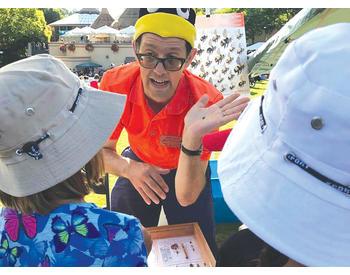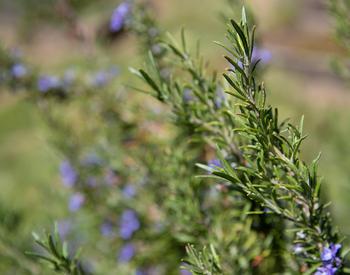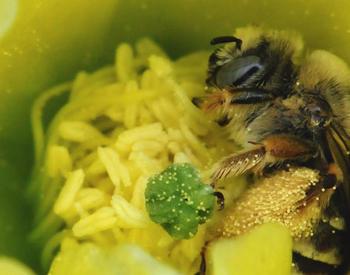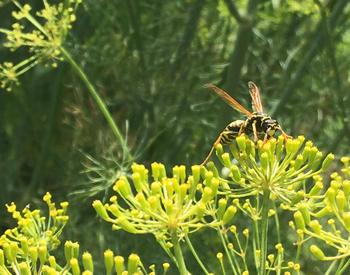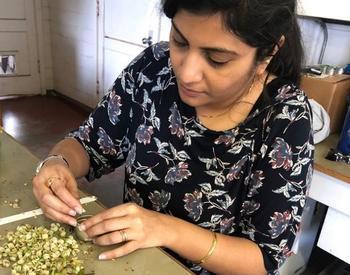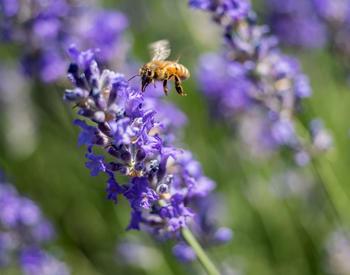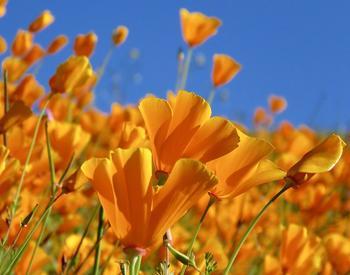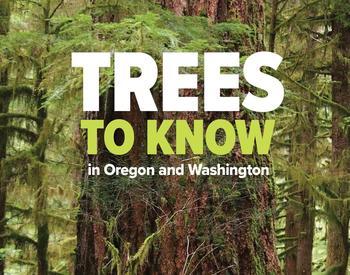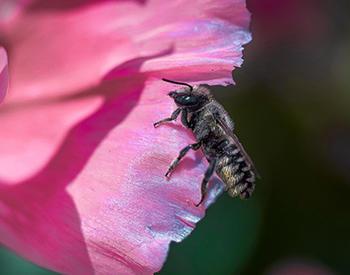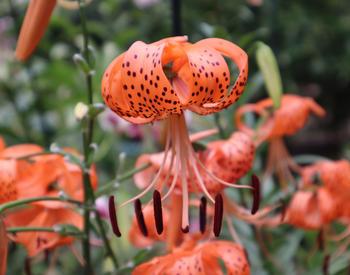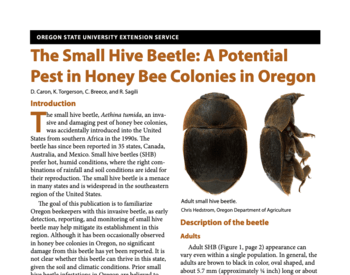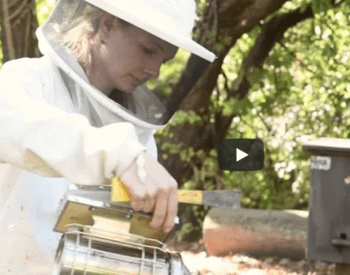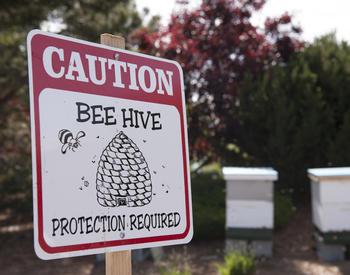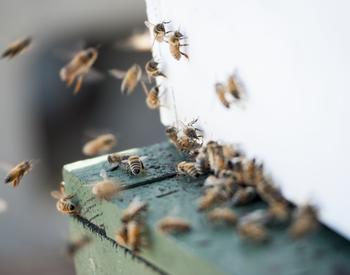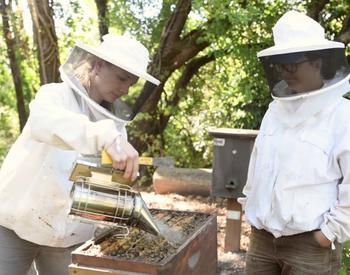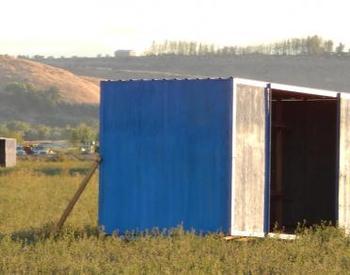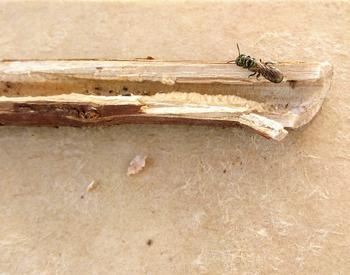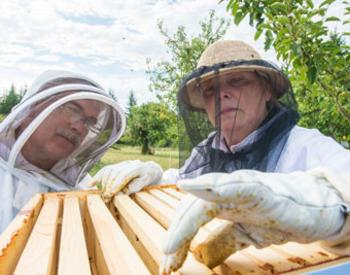Transcript
Speaker 1: From the Oregon State University Extension Service, this is Pollination, a podcast that tells the stories of researchers, land managers, and concerned citizens making bold strides to improve the health of pollinators. I'm your host, Dr. Adoni Melopoulos, assistant professor in pollinator health in the Department of Horticulture. Today's episode of Pollination focuses on citizen science and pollinators, we've talked about citizen science in the past, but our guest today, Aaron Udall, is going to talk about it from a different angle. What if we think about citizen science not just as a tool to generate data, but really to generate new stewards, like people who can take ownership of pollinator initiatives and really advance them?
That's the focus of a lot of Aaron's work in Vancouver, British Columbia, where she works with a lot of community groups around monitoring, but also planting pollinator gardens, and generally raising awareness about pollinators and their roles. So hope you enjoy this episode, and I want to apologize. I think we've been going biweekly for the last couple of weeks. We are back on a weekly schedule now, and we have a really exciting season planned for you. So I hope you enjoy this episode, and I hope you enjoy this new season of Pollination. I'm really excited to have Aaron Udall here. Welcome to Pollination.
Speaker 2: Thank you. Excited to be here.
Speaker 1: Well, I'm excited that you're here too. We've spent the day driving around the Willamette Valley having a conversation, so we really wanted to try and capture some of this in an interview. The one thing that came across when we were driving up and down the valley, we were talking about citizen science and the kind of need for citizen science when doing work around native bees. It seems like a really something really important. There's so much land out there.
How are we possibly going to do this without regular people who are already in the landscape looking at things? Tell us a little bit about your experience with citizen science and native bees.
Speaker 2: Yeah, I first got excited about native bees when I was in university. And afterward I got hired by a nonprofit to do some research for them. And they were a community-based organization. And I just thought, well, it makes a lot of sense that we'll use the network of people already out there to help with this research.
Speaker 1: And I remember when we were saying this was sort of the first venture for that organization working with bees. So it had had a lot of environmental work in other areas. So this is its first foyer into bees.
Speaker 2: Yes. And native bees specifically, were already doing some work with honeybees. But no one was really doing much outreach and public education around native bees in Vancouver, which is where I'm from.
And so this was kind of the first attempt to do that. And I learned a lot along the way of working on designing a citizen science program. So what I did was get groups of people to train them on how to ID bees up to guilds of bees.
Speaker 1: Explain a little bit what a guild is.
Speaker 2: Yeah. So a guild of bees is kind of a group of bees that live and rely on similar resources within an ecosystem. So they're kind of all involved in this same niche.
Speaker 1: So like a ground-nesting bee would be kind of like a guild.
Speaker 2: Yeah, a ground-nesting bee. So it doesn't really matter, you know, their taxonomic differentiation in these groups. It just matters that they all nest in the ground because at the end of the day, if there isn't a suitable habitat for ground-nesting bees, they can all become clumped together. It doesn't matter if they're this species versus this species.
Speaker 1: OK, so you started a training program sort of anchored around this idea of groups of bees that had this kind of similar life histories. And how did that go?
Speaker 2: The first couple of years didn't go super well in terms of data collection. And people were really excited about the program. But what I quickly realized was that it wasn't so much the protocols that we had set up or I had established with the groups.
It was kind of more about how to keep them engaged over the whole summer, how to make sure that they felt safe and secure in what they were looking at as a pollinator. Yeah.
Speaker 1: We've run into this. We have people get a little bit of training, but there's this real kind of trepidation of like, I don't know. I really don't feel that confident.
Speaker 2: Totally. Am I doing it wrong? Yeah, yeah. And I always try to say to people, yeah, maybe, but give it your best shot and you're never going to get better unless you just try. It's just a data sheet right now, especially when you're doing training, which is kind of the whole point of trying to practice something and learn.
Speaker 1: Although in some ways it's in it's kind of an inversion of how I think, you know, I might even think about citizen science. I'm thinking of the data I'm going to get at the other end. So I'm not really focused on thinking that can the person pull the protocol off rather than their independence.
Speaker 2: Well, I would say that those two things are linked. Their independence and the data at the end of the day are tied together. If you don't set people up to feel empowered in what they're looking at and that they themselves are important contributors to this, then the data is not going to reflect that because things will, bees will fly by and, you know, be like, oh, I don't really know. So I just won't write anything down. And yeah, that's due to training, not due to the individual person. I think anyway. So what I found right at the beginning was the first year I did a one-day training and the second year I doubled that training.
Speaker 1: I made it two days. I made it two days because it just wasn't sufficient. And how I designed that was I put way more emphasis on the first day on just explaining science and explaining the role of citizen science. To be able to report on what we might find out there, you know, and just break down little things. Why are we doing a transect in this kind of way?
Here are the other three ways that I thought about splitting up data collection, but we're going to do it this way. And here's why. Right. And so it gives people kind of a buy-in and and to sit and have a dialogue and actually debate about some of these things. You know, we'll often sit for a little while and say, oh, well, you know, if you do it that way, then there's this
Speaker 2: the downside of you're going to lose this kind of information. And we'll yeah, you're right. And then also, but we'll have this to gain. And if we did it that way, we'd also lose this something else. And so they start to feel responsible for not just the information, but for how the information is collected.
Speaker 1: So suppose when you're handed a protocol, the first thing is like the protocol is probably vetted and kind of solid. And people probably don't understand sometimes the protocols are being adapted for agricultural settings. Totally might not be real perfect. Yeah.
Speaker 2: And what actually went into this datasheet, all they see at the end of the day is the data sheet and that they are, I don't want people to feel like they're just a tool to collect information that they are part of the information. I think it was Carl Sagan who said that science is not so much a body of information, but a way of thinking. And so I want people to feel like they are a part of that way of thinking and not just, you know, the equivalent of an iPhone collecting information or something.
Speaker 1: More than that. You know, two things come to mind. The first one is that there is this kind of how, you know, experts are made like scientific experts aren't made through the kind of straight path.
There's a, you almost have to, I can't think about how many experiments I did where I just threw away the data. But really, that wasn't the point of it. It was, you know, gaining the experience and the competency that was the value. But it's so dispiriting because at the end of the day, you know, what are you left with?
What have you generated? But the second thing it makes me think of is this whole, you know, there is this kind of appeal of I can just load it up on iNaturalist. Sort of, it's automatic. There's an automatic, which is obviously such a great tool, but one doesn't have to think about this engagement issue. And it strikes me that one thing that you've learned from your experience is the engagement issue is almost as important as these tools.
Speaker 2: I would say that you have to put, if not more, just as much effort and investment from the very top, like from funding all the way down to that specific workshop that you're doing on that day.
into people rather than just what you're going to get out of it. It's been my experience that, and a lot of people wanna fund right now, big data programs and using technology, which we have a huge advantage to at the moment, but if you are not doing the outreach and education for people to actually pick that thing up and engage with it, we run the risk of these huge investments just sitting on a computer somewhere or getting lost somewhere or not being used at all. So the education and engagement piece is huge and it's never just one thing. People are complex creatures and they wanna get involved for different kinds of reasons.
And so it's not just tackling it from an environmental issue or an economic issue or a resource issue. You have to have answers to all these things and bring people in in such a way that you can invite them and meet them where they are. Oh yeah, that's great.
Speaker 1: That's really well said and it can just also in my mind imagine that something you said just earlier about how people, how you started. The person who goes out and they're like, I'm not sure if I should count that or not count that. And probably part of the whole chain is like, will this data be meaningful in any way or form towards these other issues?
Like how does my small observation add up to something? Yeah. Like that part's probably always missing. It's like, just do this protocol. And it's like, how will this link up with these concerns I have?
Speaker 2: Yeah, and I try to always be really honest with people about that question that, you know, this is not perfect and it doesn't have the capability to have the data resolution that some other projects might. But it is kind of a long-term capacity-building project and people and their ability to be curious and feed into a narrative that scientists can then use to tell a story is a really important part of science. And I think I veered away from your original question there.
Speaker 1: No, I think that was exactly it. There is a kind of way in which we all have a kind of role but understanding what our roles are.
Speaker 2: Yeah, and is this data useful? The other thing I'll say to that is I always try to think about kind of, I don't know what the term would be here, but scale capacity for people to understand what they just accomplished. So if I grew up with a group and we monitored one specific garden, I then make a big effort to write a report on what we found during those couple days that that group was out and make sure to share it with those people. So they see that their efforts are visible and there is a direct story.
And then that data also might go to some larger data set that can be shared in the future once everything is gathered, but that piece is not invaluable in and of itself.
Speaker 1: That's great. Let's take a little break and then we'll come back and talk a little bit more about how this is, you know, as you're moving forward, sort of what are the next steps and how this experience is shaping the way you are going to be approaching citizen science or how we might think about it here in Oregon.
Welcome back. That was really interesting. We were talking in the last segment about citizen science and sort of inverting things, you know, getting citizen science scientists empowered and just a lot more active in the development of protocols.
And it strikes me that this hits at a kind of problem. And on the show, we've had lots of guests talk about citizen science as being essential. Without it, there's no possible way of reducing funds and conservation research. We could possibly, for example, know what was going on with a pollinator population over time. We really have to have citizen scientists active, but there seems to be still a disjunction between, it's not a smooth mechanism of operation between high-level taxonomy and ecologists and citizen scientists. And why don't you expand a little bit more about that kind of disjunction and sort of what's at the, you know, why is it that there are disjunctions and how it might be resolved? What kind of steps might be taken to kind of get around these problems, and make it run smoother?
Speaker 2: I think that's a great question. And I think that a couple of reasons that science has done, well, science has done a very poor job of engaging with the public is because kind of the culture of science recently has been very competitive. We use a lot of high-level language that is celebrated within the community as if I am a little, if I know a little bit more, I am the expert and we value expertise very well.
Yeah, yeah, for sure. Yeah, so we use language, we use funding, and people kind of see scientists as someone living in this little ivory white tower that they don't have access to. And I think that has caused a lot of disengagement. And even if you look around politically right now, we see a huge amount of people actually resentful and disbelieving and distrusting of science. And sometimes not for poor reasons, but using the scientific process is one of our greatest tools. And in order to get people back to that trust, that place of wanting to be part of that process, we have to give them opportunities and tools to engage with it. And I think that's where citizen science comes in and has a real opportunity to value people again and not ivory tower all of the great things that science is trying to accomplish, that people are actually part of science, that their attempts to contribute are valuable, even if they don't totally get to the goal every single time. of experiments failed by experts all the time. We never tell anybody about them.
No, God forbid. So I think being people's advocate and their biggest ally when they want to participate and they want to contribute is part of it. And that's why I think extension is so powerful. And I really believe in the bottom-up approach to mentorship that the people who have their eyes and ears on the ground are your most important, most valuable people. And it's not about them conforming to your standards and your skills, it's you giving your skills to them. And so if people have ideas, and they do, people have a lot of ideas once you give them a little bit of information and knowledge, finding ways of getting these really high-level skills like statistics and thinking about how to design an experiment or a project to them and letting them kind of run with some of their ideas and contributing to them rather than them thinking of it as them contributing to the scientist, you're going to empower people.
Speaker 1: Well, you know, and we have some very persistent non-professionals in the state who have made immense contributions to understanding native bees. And a lot of them are just very persistent.
And I guess the thing is, it shouldn't require that level of persistence. And then we were talking a little bit at the break about Joseph Wilson's and Olivia Messenger's Carol's book and how when he was on the episode, he talked about the fear of keys. That when they were writing that key, they were going to make sure that they were going to explain the words. Like what you said earlier, there's a kind of almost a celebration of, you know.
Speaker 2: Elitism in science.
Speaker 1: Yeah, the taxonomic like barriers to some of these things that may have, for some reason, you know, there's a way in which like it was, it's just a classification system.
But now when we're using those same keys and trying to engage people, it's a real obstacle. And if you're going to show this specialized organ, the thing I love about the book is that they'll take that thing and they'll show it to you clearly. This is what we're talking about. It's this little thing between like it's called this.
Don't worry about it. But they also have the pronunciations in there. That's the thing I always appreciate because there is a little snobbery around pronunciations.
It's like, can you actually pull that one off? And I think in some of the early episodes, people probably laughed at some of my pronunciations, but I'm getting sort of, but I've been inculturated. I've sort of got the pronunciations now.
I get paid to learn these pronunciations, but other people don't. And that's kind of real. That shouldn't be, it shouldn't just be the most persistent like dogged people who are going to be the citizen scientists. It should be more broader than that. Absolutely.
Speaker 2: You're going to miss a lot of people if that's the expectation. And there are tons of people out there that are interested and curious to engage. And it's capitalizing, finding ways to capitalize on those opportunities because once you push someone aside, it takes a really strong-minded person to kind of push back, especially to someone in a position of power, and say, no, I want to be a part of this. I want to engage. So most people will just check out if that is what's happening. And yeah, we're going to miss a lot of people.
Speaker 1: Yeah, I was, when we first met at a native B course in British Columbia, you had this booklet, which I thought was really well put together. It had really kind of done a nice job of bridging that gap. There was enough of the biology in there, but there was also a kind of a playfulness in the language of what different bees were. I think, was it you guys who came up with the idea of mega-kylids as pollen bellies.
Speaker 2: That is actually from Elizabeth Elly. Oh, okay. So I'll give her credit for that. Sounds great. But yeah, I've definitely taken that from her. And yeah, using language that people are familiar with and can relate to, a lot of times when I explain bees to kids, I'll point to different things on my body. Obviously, that's not taxonomic.
Speaker 1: It's not my abdomen.
Speaker 2: Yeah, but then point it out on the board or whatever. It's a way for them to relate to what I'm speaking about and it's not high-stakes science here. It's just getting them interested.
Speaker 1: Hey, we also came from a meeting this afternoon where we were talking with an artist as well, sort of bees and artists. And maybe one way to sort of round out the conversation here is, so the booklet, what was the name of the book again? I had a copy and then I loaned it to somebody.
Speaker 2: The Booklet's name is...
Speaker 1: We will link it on the show notes.
Speaker 2: It's an introductory guide to the bees of British Columbia.
Speaker 1: And the thing that I remember you mentioning, there was an artist engagement in coming up with the project.
Speaker 2: Yeah, there was actually two cool things I really like about that project one, we kind of engaged experts, quote unquote, in the field and some of them were artists and people that have designed Booklets and images of bees before. And they kind of see things in a way that's, like, is this pleasing to the eye?
Do I want to continue to the next page or am I just totally zoned out already? And then the other panel and group that we engaged was just a bunch of, they were people that had done my citizen science program, but they were still pretty lame in terms of ability to ID, anything because we'd just go to Gild. And their feedback, I would say, was just as important as the experts because they looked at that guidebook in a way that I don't have the lens to look at anymore because they're looking at it with fresh eyes.
Someone who's never learned about pollinators before. And we're able to say, this section over here is really confusing to me. I don't know what you're trying to get at. And that is invaluable information. So again, bottom-up approach, giving people, meeting people where they're at, and valuing their experience.
Speaker 1: And also bringing artists into sort of, if you know the sticking point is here, using, being able to highlight or drawing your eye to these features, and then it sort of makes it.
Speaker 2: Yes, and I love working with artists. I think that they have the capacity to engage people in a totally different way than science is able to, as I said before, science is a way of thinking and it's a way to tell a story. It's not the only way to tell a story. An artist can tell the same story or take the same narrative and tell it in a much different medium and way to people that is sometimes able to touch on some of the emotional aspects of the stories that we're trying to tell that science misses. And I really value them for that.
Speaker 1: It just reminds me, we had an episode with a Halifax artist, Ruth Marsh. You can send her dead bumblebees and then what she does is she rehabilitates them with. And then she does the stop animation. So she's got these bumblebees that are kind of like, their legs are like bejeweled. And so they've got these legs that are kind of like, they're kind of like these little Frank, but they're so, it's kind of this great, it was this really great combination of the bees, you know, there's a concern with bees combined with putting them back together, but not in a way that was macabre, but it was almost like playful. But you're also, there was this tension in the work that really kind of gave, oh yeah, there are multiple things going on, but you couldn't have expressed that really in another way. It was a really powerful piece of work.
Speaker 2: Yeah, exactly. Things like that are all part of the story and need to be included.
Speaker 1: Well, the last thing I was just gonna ask you is, I think we sort of touched on it, but the stakes of this, like why should we be, you know, want to solve this problem? I think you've talked all around it there, but maybe just some closing thoughts on why we need to get the citizen science part right, apart from data collection.
Speaker 2: Yeah, the data collection is really important. Also I would call it stewardship with a capital S is maybe the bigger impact here of doing projects like this. People have the opportunity to connect with nature in a way that maybe they have turned off in their minds for a long time, especially as adults. You know, we get so busy in the world doing daily life. And I think everybody has a relationship with nature that they want access to and they don't always get the opportunity to engage with.
And I've seen the transformation happen. Bees are especially a really cool creature to do citizen science with because often people have ideas around bees that they're scary, they're sometimes fearful things, but they also understand on a deep, deep level that we need them desperately, we need them. But when you show people that they're, you know, not cartoons and they're not big scary killer bees that are coming to kill, they're just these organisms that are in our very own backyards. And all these different species have amazing stories behind them. And once people can have access to that knowledge, I feel like they are able to change their whole mindset about nature and about engaging with the natural world.
So I think what is at stake is our future decision-making about how we see ourselves in the natural world and the decisions that we make about our place in it.
Speaker 1: That's great. Well, let's take one more break and then we're gonna come back. We have three questions we ask all our guests. I'm very curious what your answers are gonna be. So we'll be back in just a second. So here at Pollination, it's our tradition. We ask all our guests these questions, three questions.
We get the darndest answers. Our very first question that we ask our guests is, is there a book that was really influential when we asked the question? Is it influential to you or do you just really want people to know about it? It's just really comprehensive, and pulls these things together. What's your suggestion?
Speaker 2: Well, I would say the best B book out there is for sure Bees in Your Backyard. But I'm also going to just mention this is not a book related to bees, but it's a book called Lab Girl. And especially for young women scientists, I think this is a really cool book. It's a story of Paleo Botanist's life as a scientist in the United States.
Speaker 1: And contemporary scientists? Or kind of like in the past?
Speaker 2: No, no, yeah, contemporary. And just a very real look at what it's like to set up a lab and kind of her journey throughout her life being a scientist. So I think that's a great one.
Speaker 1: No problem, we've all had lots of non-B books and they've been really great suggestions. Good. Our second question for you is, is there a tool when you're doing the kind of work that you do in citizen science, is there a kind of tool that is really, and it ranges like I think Dave Phillips in the last show said it was his iPhone. But we know he said it's Samsung S7. So he's very kind of brand-specific. But it goes all the way to eyeballs. I think Francis Ratnick's in the very first shows that is with eyeballs. My favorite tool.
Speaker 2: God, I feel like I'm going to be very esoteric in my answer. I don't know, the belief in what I'm doing is important.
Speaker 1: Totally, I mean, to be able to, I think the thing that sort of missed on people maybe who are starting off is, it'll take more than your lifetime. Like if you're really into doing native B work, you're really kind of in some ways just laying, I think you expressed it really well, you're kind of laying the infrastructure for someone else. You have to kind of be motivated by that. That takes a lot of...
Speaker 2: Belief. Yeah, and I hope that belief can be backed up with some data. I mean, I'd like to think of myself as a scientist.
Speaker 1: I think it's totally compatible. I have a lot of belief in the volunteers that I work with, they have a lot of capacity. Absolutely. They can really do things. I've seen them do things that have just been, you know, we have some people in the state who've been doing things on their own that is breaking ground actually. And they are just dedicated.
I have a lot of faith in people to pull those things off for sure. Yes. Okay, so our last one is... B. Uh-huh. There be that when you see, I know all Bs are great, but when you see this B go by, you're like, ah, that B.
Speaker 2: I would say that it changes constantly throughout the season.
Speaker 3: Every time a new B comes out, I'm like, oh, you're my favorite. No, I love you the best. But I would say that one of the most significant experiences that contributed to my journey into B Dumb is the first B job that I ever got was with Dr. Elizabeth Elly. I was in an interview with one of her graduate students, and I was totally not qualified to be a technician for. And she opened up a box of Bs in front of me and I was just amazed. I actually didn't get that job with her grad student, but I think Elizabeth saw something in my excitement and hired me for the summer to do some other work with her, which was the start of all of this. So that was probably one of my most significant times.
Speaker 1: I know that same feeling. And we have talked about the magic of a box of Bs. Yes.
Speaker 2: Minor currently stored in pizza boxes. Oh, wow. Children either get extremely excited or extremely disappointed when I open up the box.
Speaker 1: Which reminds me, we got to order some pizza ourselves. So dear listeners, thank you so much for being here for the show. And as I've mentioned in all the shows, we are looking for ideas for shows and we'd love to do a show devoted to your questions.
You've got questions about Bs or other pollinators. I know we're planning to do some butterfly shows later this winter. We really want to hear from you.
So make sure to send us a note. Hey, thanks so much for joining us. Thank you.
Thanks so much for listening. Show notes with information discussed in each episode can be found at pollinationpodcast.oregonstate.edu. We'd also love to hear from you and there are several ways to connect. For one, you can visit our website to post an episode-specific comment, suggest a future guest or topic, or ask a question that could be featured in a future episode. You can also email us at pollinationpodcast.oregonstate.edu. Finally, you can tweet questions or comments or join our Facebook or Instagram communities. Just look us up at OSU Pollinator Health. If you like the show, consider letting iTunes know by leaving us a review or rating.
It makes us more visible, which helps others discover pollination. See you next week.
Erin Udal leads community pollinator conservation projects out of Vancouver, BC and was formerly the Program Manager and Pollinator Specialist with the Environmental Youth Alliance. With her background in conservation biology, she designs bee-friendly gardens and develops citizen science projects, working to help people protect pollinators in our backyards and parks. Erin finds facilitating hands-on outdoor education very rewarding, and always pleased to share the fascinating and diverse world of native bees with anyone who cares to learn.
You can Subscribe and Listen to PolliNation on Apple Podcasts.
And be sure to leave us a Rating and Review!
“Using the scientific process is one of our greatest tools, and in order to get people back to that trust, we have to give them opportunities and tools to engage with it.“ – Erin Udal
Show Notes:
- Why Erin’s first couple years of data collection didn’t go so well
- How Erin goes about preparing citizen scientists
- The reason that there isn’t better communication between scientists and the public
- The way that Erin hopes to move scientific literacy forward
- Why Eric uses the bottom-up approach to leadership
- The movement towards making science accessible to a broader audience
- How an artist can bring science a different narrative
- What Erin means by “Stewardship with a capital S”
“I think it was Carl Sagan that said, ’Science is not so much a body of information, but a way of thinking’, and so I want people to feel like they are part of that way of thinking.“ – Erin Udal
Links Mentioned:
- Check out the book Erin was involved in producing, “Common Pollinators of British Columbia”
- Learn more about the Environmental Youth Alliance’s Pollinator Citizen Science Program
- Check out Erin’s favorite books, “The Bees In Your Backyard” and “Lab Girl”
- Connect with Erin Udal on Facebook and Twitter
